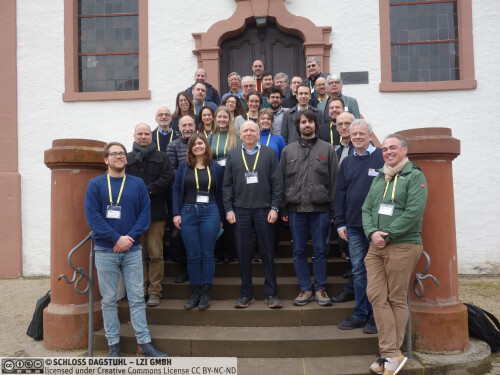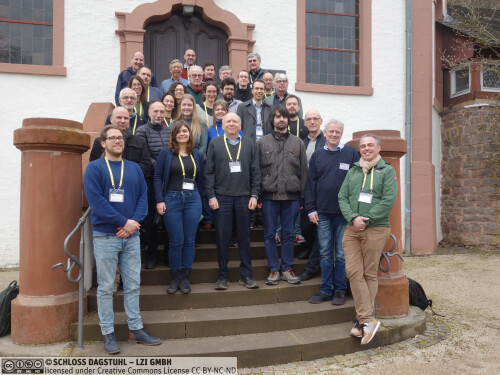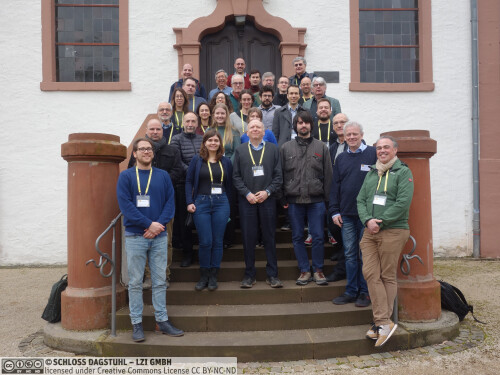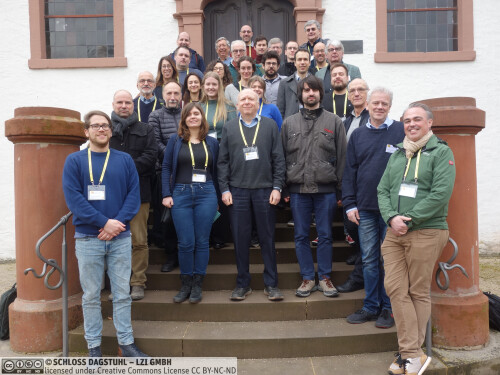Dagstuhl-Seminar 25081
Semirings in Databases, Automata, and Logic
( 16. Feb – 21. Feb, 2025 )
Permalink
Organisatoren
- Guillermo Badia (University of Queensland - Brisbane, AU)
- Manfred Droste (Universität Leipzig, DE)
- Phokion G. Kolaitis (University of California - Santa Cruz, US & IBM Almaden Research Center - San Jose, US)
- Carles Noguera (University of Siena, IT)
Kontakt
- Andreas Dolzmann (für wissenschaftliche Fragen)
- Christina Schwarz (für administrative Fragen)
Gemeinsame Dokumente
- Dagstuhl Materials Page (Use personal credentials as created in DOOR to log in)
Programm
Semirings are fundamental algebraic structures that in recent times have found a number of applications to computer science, especially in the areas of databases and automata. On the side of databases, commercial query languages, such as SQL, use bag semantics, instead of set semantics, to evaluate relational database queries, which means that the semiring of the natural numbers is used to annotate tuples in the input and output relations. More generally, the annotations can be values in some fixed semiring; this gives a common generalization of both set semantics and bag semantics of database queries, and also makes it possible to model other situations in which one is interested, e.g., in the probability or the reliability of an answer. Furthermore, semirings of polynomials have been successfully used to carry out a rigorous study of provenance in databases. On the side of automata, semirings are used to define weighted automata, which are nondeterministic finite automata augmented with values from a semiring as weights on the transitions. These weights may model, e.g., the cost involved when executing a transition, the amount of resources or time needed for this, or the probability or reliability of its successful execution. Weighted automata have found numerous applications to natural language processing, speech recognition, and algorithms for digital image compression.
These applications have inspired numerous investigations in the logic-in-computer-science community. For instance, motivated by the work on semirings in databases, the evaluation of arbitrary first-order formulas in semirings has been recently explored in the literature, where, among other things, the relation between elementary equivalence (i.e., indistinguishability in first-order logic) and isomorphism on finite structures has been examined. In the same vein, various notions of locality in the semiring framework have been studied and zero-one laws and convergence laws have been obtained, whereas Ehrenfeucht–Fraïssé games have been used to characterize equivalence up to bounded quantifier rank under semiring semantics. As regards semirings and automata, Kleene’s classical theorem on the characterization of languages recognized by automata with languages denoted by regular expressions was extended by Schützenberger to the behaviors of weighted automata and rational power series. By a fundamental theorem of Büchi, Elgot, and Trakhtenbrot, finite automata have the same expressive power on words as monadic second-order logic; therefore, various problems about this logic on words are decidable. In recent years, a suitable weighted logic was developed and shown to have the same expressive power on words, trees, and graphs as weighted automata. Consequently, this weighted logic has similar decidability properties on these structures as the unweighted monadic second-order logic. In turn, both of these approaches could be seen as part of the framework of many-valued logics, where algebraic structures expanding semirings with suitable operations have been studied for a long time.
This seminar brought together researchers from three communities that share an interest in semirings, namely databases, automata and multi-valued logic. The goal was to develop a research agenda, featuring tutorials, contributed talks, and discussions on open problems and future directions. Overall, the seminar was a success.
Organization of the Seminar. The seminar was held between February 16-21, 2025 from Monday to Friday. There were five invited tutorials with long 75-minute talks, two from the database community, two from the automata community, and one from the multi-valued logic community, that helped define a common language and a common set of problems, and 16~contributed 25-minute talks from experts in all these fields. The tutorials were given by
- Val Tannen on the semiring framework of data(base) provenance;
- Erik Paul on weighted automata and weighted logics;
- Erich Grädel on the model theory of semiring semantics;
- Sara Ugolini on the algebraic semantics of many-valued logics; and
- Peter Kostolányi on models of computation over semirings.
In addition, there was a session where five open problems (some of them rather major) were presented. Our collectors, Sophie Brinke, Lovro Mrkonjić, and Gaia Petreni, recorded all open problems, and later collected them for inclusion in the full report. Finally, there was a closing session to formulate future research directions. The schedule was developed in a way that allowed sufficient time for informal discussions and exchange of ideas between participants.
Outcomes of the Seminar. There are several major outcomes:
- The presence of participants with very diverse backgrounds enabled us to exchange interesting ideas. For example, logicians and algebraists were strongly inspired by the problems in the database community, and database theoreticians learned relevant facts about semirings from the automata and algebra people. New collaborations emerged during the seminar, and there are some new papers with authors from different communities currently in the writing.
- We have assembled a list of open problems from all involved areas, which we included here. We hope that this list will help define the community interested in semirings, and will also inspire young researchers to contribute to this currently very timely area.
- A follow-up seminar is already being planned with a modified team of organizers (including two of the present ones, Guillermo Badia and Carles Noguera, together with Val Tannen and Thomas Eiter), adding the new community of AI.
Acknowledgements. We are grateful to the Scientific Directorate and to the staff of the Schloss Dagstuhl – Leibniz Center for Informatics for their support of this seminar. We also wish to express our sincere thanks to Sophie Brinke, Lovro Mrkonjić and Gaia Petreni for collecting the abstracts of the talks and compiling the list of open problems.
 Guillermo Badia, Manfred Droste, Phokion G. Kolaitis, and Carles Noguera
Guillermo Badia, Manfred Droste, Phokion G. Kolaitis, and Carles Noguera
Semirings are fundamental algebraic structures that in recent times have found a number of applications to computer science, especially in the areas of databases and automata. On the side of databases, commercial query languages, such as SQL, use bag semantics, instead of set semantics, to evaluate relational database queries, which means that the semiring of the natural numbers is used to annotate tuples in the input and output relations. More generally, the annotations can be values in some fixed semiring; this gives a common generalization of both set semantics and bag semantics of database queries, and also makes it possible to model other situations in which one is interested, e.g., in the probability or the reliability of an answer. Furthermore, semirings of polynomials have been successfully used to carry out a rigorous study of provenance in databases. On the side of automata, semirings are used to define weighted automata, which are nondeterministic finite automata augmented with values from a semiring as weights on the transitions. These weights may model, e.g., the cost involved when executing a transition, the amount of resources or time needed for this, or the probability or reliability of its successful execution. Weighted automata have found numerous applications to natural language processing, speech recognition, and algorithms for digital image compression.
These applications have inspired numerous investigations in the logic-in-computer-science community. For instance, motivated by the work on semirings in databases, the evaluation of arbitrary first-order formulas in semirings has been recently explored in the literature, where, among other things, the relation between elementary equivalence (i.e., indistinguishability in first-order logic) and isomorphism on finite structures has been examined. In the same vein, various notions of locality in the semiring framework have been studied and zero-one laws and convergence laws have been obtained, whereas Ehrenfeucht–Fraïssé games have been used to characterize equivalence up to bounded quantifier rank under semiring semantics. As regards semirings and automata, Kleene’s classical theorem on the characterization of languages recognized by automata with languages denoted by regular expressions was extended by Schützenberger to the behaviors of weighted automata and rational power series. By a fundamental theorem of Büchi, Elgot, and Trakhtenbrot, finite automata have the same expressive power on words as monadic second-order logic; therefore, various problems about this logic on words are decidable. In recent years, a suitable weighted logic was developed and shown to have the same expressive power on words, trees, and graphs as weighted automata. Consequently, this weighted logic has similar decidability properties on these structures as the unweighted monadic second-order logic. In turn, both of these approaches could be seen as part of the framework of many-valued logics, where algebraic structures expanding semirings with suitable operations have been studied for a long time.
The main goal of this Dagstuhl Seminar is to bring together researchers from the different communities mentioned above and to develop a research agenda for studying semirings, guided by a collection of diverse applications. The seminar will feature invited tutorials and long talks, contributed talks, a problem session, and a closing session to formulate future research directions. The schedule of the seminar will be developed in such a way that will allow sufficient time for informal discussions and exchange of ideas between participants.
 Guillermo Badia, Manfred Droste, Phokion G. Kolaitis, and Carles Noguera
Guillermo Badia, Manfred Droste, Phokion G. Kolaitis, and Carles Noguera
Please log in to DOOR to see more details.
- Samson Abramsky (University College London, GB) [dblp]
- Paolo Agliano' (University of Siena, IT)
- Antoine Amarilli (Inria Lille - Nord Europe, FR) [dblp]
- Albert Atserias (UPC Barcelona Tech, ES) [dblp]
- Guillermo Badia (University of Queensland - Brisbane, AU) [dblp]
- Johanna Björklund (University of Umeå, SE) [dblp]
- Camille Bourgaux (CNRS & ENS - Paris, FR) [dblp]
- Sophie Brinke (RWTH Aachen, DE)
- Silvia Butti (University of Oxford, GB) [dblp]
- Miroslav Ciric (University of Niš - Serbia, RS) [dblp]
- Victor Dalmau (UPF - Barcelona, ES) [dblp]
- Frank Drewes (University of Umeå, SE) [dblp]
- Manfred Droste (Universität Leipzig, DE) [dblp]
- Thomas Eiter (TU Wien, AT) [dblp]
- Boris Glavic (University of Illinois - Chicago, US) [dblp]
- Erich Grädel (RWTH Aachen, DE) [dblp]
- Marcel Jackson (La Trobe University - Bundoora, AU) [dblp]
- Phokion G. Kolaitis (University of California - Santa Cruz, US & IBM Almaden Research Center - San Jose, US) [dblp]
- Peter Kostolányi (Comenius University - Bratislava, SK) [dblp]
- Egor Kostylev (University of Oslo, NO) [dblp]
- Paris Koutris (University of Wisconsin-Madison, US) [dblp]
- Tomasz Kowalski (Jagiellonian University - Kraków, PL) [dblp]
- Dietrich Kuske (TU Ilmenau, DE) [dblp]
- Filip Mazowiecki (University of Warsaw, PL) [dblp]
- Lovro Mrkonjic (RWTH Aachen, DE) [dblp]
- Hung Ngo (relationalAI - Berkeley, US) [dblp]
- Carles Noguera (University of Siena, IT) [dblp]
- Nina Pardal (University of Huddersfield, GB) [dblp]
- Erik Paul (Universität Leipzig, DE) [dblp]
- Vitaly Perevoshchikov (Herrischried, DE) [dblp]
- Gaia Petreni (University of Siena, IT)
- Jacques Sakarovitch (IRIF, CNRS / Université Paris Cité, FR & LTCI, Télécom Paris, IPP, FR) [dblp]
- Žaneta Semanišinová (TU Dresden, DE) [dblp]
- Dan Suciu (University of Washington - Seattle, US) [dblp]
- Val Tannen (University of Pennsylvania - Philadelphia, US) [dblp]
- Balder Ten Cate (University of Amsterdam, NL) [dblp]
- Wolfgang Thomas (RWTH Aachen, DE) [dblp]
- Sara Ugolini (IIIA-CSIC - Bellaterra, ES) [dblp]
- Jonni Virtema (University of Sheffield, GB) [dblp]
Klassifikation
- Databases
- Formal Languages and Automata Theory
- Logic in Computer Science
Schlagworte
- Semirings
- Databases
- Multi-valued logic
- Weighted automata
- Finite model theory





 Creative Commons BY 4.0
Creative Commons BY 4.0
